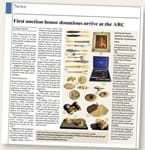
Vincent Geerling, chairman of The International Association of Dealers in Ancient Art (IADAA) and Joanna van der Lande, chairman of The Antiquities Dealers’ Association (ADA).
These operations, involving numerous countries and their police forces, have been running for around 10 years now under titles such as Athena, Odysseus and Pandora, this latest being Pandora VII.
More than once we have checked the claims being made by law enforcement in their media releases following these operations and found them wanting. This latest operation is no different.
The Europol media release states that the operation led to the arrest of 60 people and the recovery of 11,049 stolen objects across 14 countries.
However, as the Antiquities Dealers’ Association (ADA) and International Association of Dealers in Ancient Art (IADAA) know well, there is a great deal of difference between seizing items and showing that they are stolen, just as arrests do not equate with convictions.
The twin priorities in carrying out these operations have always been to clamp down on money laundering and terrorism financing, but while there may have been limited evidence of the former across the years, we have heard of no evidence at all of the latter.
Once again, we contacted Europol asking the following: a) How many arrests have led to successful convictions? b) How many seizures proved to be valid + how many had to be returned to their owners? c) How many seizures were shown to be linked to money laundering? d) How many seizures proved to be linked to terrorism financing?
Europol’s media office replied on May 10 as follows: “Unfortunately, we won’t be able to help as we do not have these figures. Europol is not a statistical organisation – Europol’s priority is to support cross-border investigations and the information available is solely based on investigations supported by Europol.”
Light on the detail
Confirmation, then, yet again that Europol has no statistics to support the claims it makes, with the further emphasis that Europol is “not a statistical organisation”.
If so, what is it doing making statistical claims it admits it cannot support in the introduction to its media release, claims that history tells us will influence policy at a national and international level?
Interpol, which has also denied having any reliable statistical information in this field, compounded the error.
As others have also argued, without accurate clear-up figures to qualify them, the published data serves no purpose beyond propaganda. To our knowledge, no such clear-up figures have ever been published over the past decade.
It is of concern that yet again a number of leading media outlets have reported the unsupported claims without checking them, thereby spreading what is essentially fake news further.
If money laundering and terrorism financing links to the art market are as widespread as the authorities would have us believe, why don’t they publish the evidence instead of misleading the public in this way?
Joanna van der Lande
Chairman, The Antiquities Dealers’ Association (ADA)
Vincent Geerling
Chairman, The International Association of Dealers in Ancient Art (IADAA)












